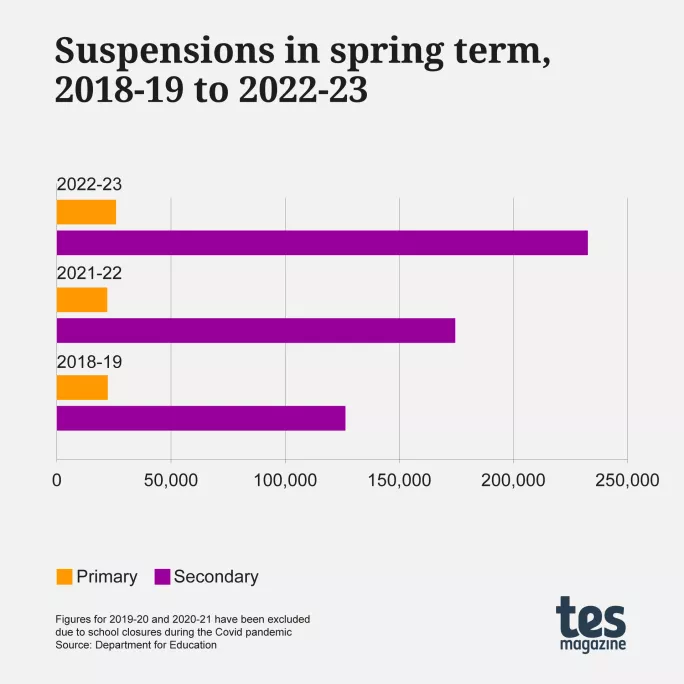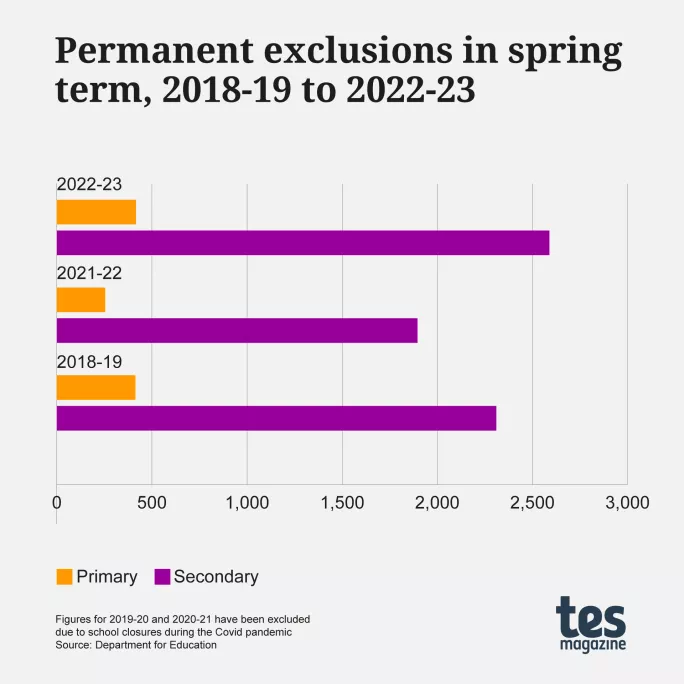The number of pupil suspensions has soared by almost three-quarters compared with before the Covid pandemic, government data shows.
Pupils were suspended 263,904 times by schools in the 2023 spring term - up by 71.9 per cent compared with the 153,465 recorded in the spring term of 2019 before the pandemic.
The number of suspensions recorded in the spring term of last year was also up by almost one-third (31 per cent) compared with the same period in 2022, when there were 200,826 suspensions.
Meanwhile, the number of permanent exclusions made by schools in the spring term of last year was an increase of more than one-third compared with the same period of 2022.
The explosion in suspensions and exclusions has come amid increased concerns about pupil behaviour and high absence rates after the pandemic.
The Department for Education data shows there were 3,039 permanent exclusions in the spring term of 2023, up by 39 per cent from the same period in 2022 (2,179).
The latest data also reveals a 10 per cent rise on the 2,751 permanent exclusions recorded in the spring term of 2019.
Increase in suspensions and exclusions
The increase in suspensions and permanent exclusions has been driven largely by a rise in the sanctions used in secondary schools, where suspensions increased by 84 per cent and permanent exclusions by 12 per cent compared with pre-pandemic levels.
However, primary schools have also seen a significant rise.
The number of permanent exclusions made by primary schools has risen back to pre-pandemic levels, with 416 recorded last spring compared with 413 in 2019.
But suspensions continued to rise last year above pre-pandemic levels in primary schools, up to 25,935, an increase of 16 per cent on the 22,281 recorded in spring 2019.
The number of suspensions in pupil referral units (PRUs) increased by over one-quarter (26 per cent) in the spring term of 2023 to 13,191, up from 10,493 in the autumn term, and up 13 per cent from the 11,684 recorded in spring 2022.
However, the total number of pupils in PRUs remains below the 16,134 recorded in spring 2019.
Analysis carried out by FFT Education Datalab earlier this year warned that “increases in suspensions and exclusions of six days or more will put additional pressure” on alternative provision.
Rise in persistent disruptive behaviour
Persistent disruptive behaviour increased most steeply as the reason recorded for suspensions, with an increase of nearly half (49.6 per cent) in spring term last year compared with 2022. Suspensions for physical assault against an adult rose by 28 per cent year on year.
Once again this year, pupils with special education needs and disabilities (SEND) without an education, health and care plan (EHCP) had the highest rate of suspensions, with 86,750 suspensions recorded.
And pupils eligible for free school meals had the next highest rate of suspensions, with 144,899 recorded.
The total number of days missed for suspensions rose by two-thirds (66 per cent) compared with pre-pandemic, rising from 310,686 to 516,073.
This was a rise of 30 per cent year on year, with 396,865 days missed in spring 2022.
For the latest education news and analysis delivered directly to your inbox every weekday morning, sign up to the Tes Daily newsletter






